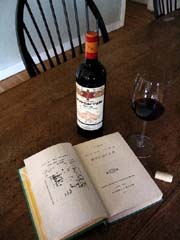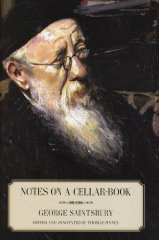Wine Book Club: Notes on a Cellar-Book
By Kori ~ January 28th, 2009.
 Thank you for joining us for the January 2009 “virtual meeting†of the Wine Book Club. Many thanks to Dr. Debs of Good Wine Under $20 who originally proposed the idea for the WBC where bloggers and wine lovers all over the world come together for book reviews and discussions after reading a selected text. The format of the WBC has changed slightly for 2009. To kick off the New Year, Dr. Debs selected Notes on a Cellar-Book by George Saintsbury.
Thank you for joining us for the January 2009 “virtual meeting†of the Wine Book Club. Many thanks to Dr. Debs of Good Wine Under $20 who originally proposed the idea for the WBC where bloggers and wine lovers all over the world come together for book reviews and discussions after reading a selected text. The format of the WBC has changed slightly for 2009. To kick off the New Year, Dr. Debs selected Notes on a Cellar-Book by George Saintsbury.
Saintsbury’s life (1845-1933) was divided between teaching and journalism; all told, he worked as a journalist, reviewer, critic, editor, and Professor of Literature at the University of Edinburgh. The entries in Saintsbury’s cellar book cover a period of thirty-one years from 1884 to 1915.
“There is no money, among that which I have spent since I began to earn my living, of the expenditure of which I am less ashamed, or which gave me better value in return, than the price of the liquids chronicled in this booklet. When they were good they pleased my senses, cheered my spirits, improved my moral and intellectual powers, besides enabling me to confer the same benefits on other people.†–George Saintsbury
While I found it to be a very interesting book—ok, it’s really a set of notes—it is a tough read. I’ve had to keep a dictionary at my side and also be ready to Google regularly to understand many of the terms he uses. Originally published in 1920 and now edited and annotated by Thomas Pinney in 2008, Notes on a Cellar-Book is not just a book on wine but covers beer and spirits as well.
 In order to really enjoy this book, I believe that you need to already know a lot about wine as well as be an academic or history buff. If you fit into those categories, grab a copy today.
In order to really enjoy this book, I believe that you need to already know a lot about wine as well as be an academic or history buff. If you fit into those categories, grab a copy today.
One thing is clear to me after reading this book; people back then longed “for the good old days†in wine just like many people say they do today. Not much has changed in over 100 years in that respect. Personally, I believe the good old days are now, but I enjoyed reading Saintsbury’s notes about the wines of that era nonetheless.
Most of the wines Saintsbury talks about in his Notes are not the kinds of wines the typical wine consumer will ever drink today. However, his examples give me hope that in my own wine searches, some of the great wines I’m finding from newer producers today will turn out to be the next Mouton Rothschild, which he found at a ridiculously low price before it established its reputation.
While Saintsbury was a prolific writer, this was his only book devoted to wine. In this book, he is tactful, but certainly not bashful, about giving his opinion about wines he tasted. For example, he wouldn’t say that a certain wine was bad; he’d just say he didn’t like it or he never bought it himself.
I was amazed by how much Saintsbury read, how much he wrote, and how much he ate and drank himself. Reading his eight-course dinner menus that were accompanied by eight wines gave me both a stomach ache and a headache. And to think that in all of his tasting, he says he never had an American wine.
In sum, I enjoyed the book, but I wonder if it fits the reading palate of most of our readers. If you’ve already read Notes on a Cellar-Book, please leave a comment and let us know what you thought of it.
For those of you who would like to read along with us in the Wine Book Club, the next three selections are:
February: Champagne: How the World’s Most Glamorous Wine Triumphed Over War and Hard Times by Don Kladstrup
March: Adventures on the Wine Route: A Wine Buyer’s Tour of France by Kermit Lynch
April: The Science of Wine: From Vine to Glass by Jamie Goode
Filed under: Wine Book Club, Wine Books

 Wine Peeps is an independent wine blog dedicated to helping you get the most bang for your buck in wine. We do this through blind tastings of wine from around the world and calculations of
Wine Peeps is an independent wine blog dedicated to helping you get the most bang for your buck in wine. We do this through blind tastings of wine from around the world and calculations of 











[…] Kori at the WinePeeps wrote a review that was very much in line with Jim Eastman’s. Like Jim, Kori found the language inaccessible and had to “keep a dictionary at my side” to clarify some of his terms. She recommends this book to “an academic or a history buff” (guilty!) She enjoyed the book but she does “wonder if it fits the palate of most of our readers.” […]